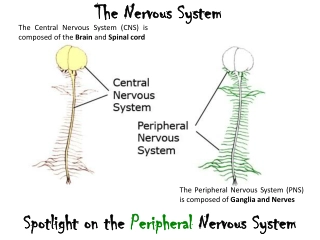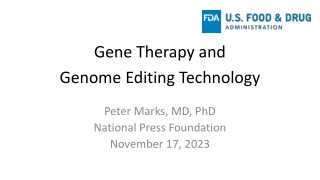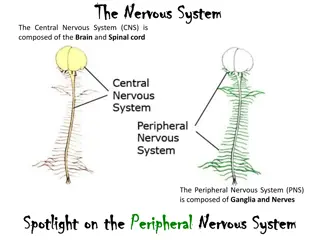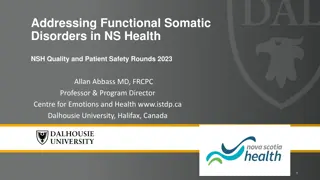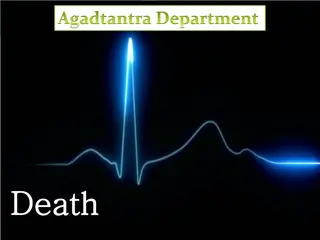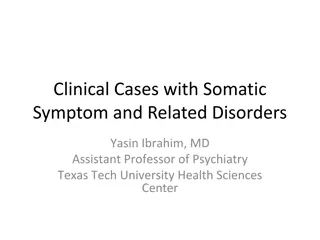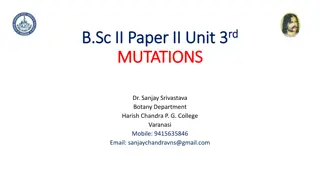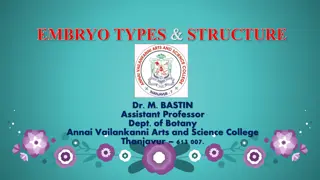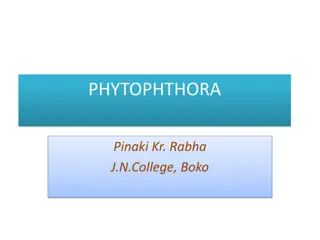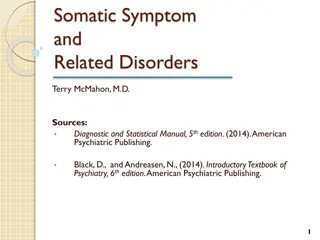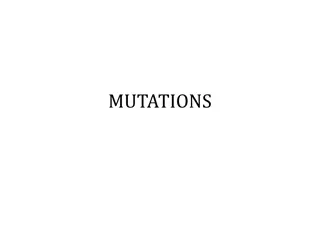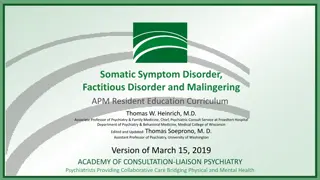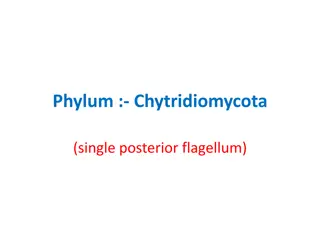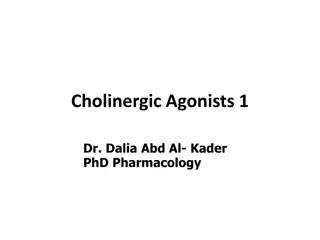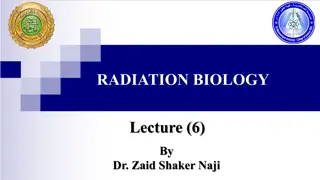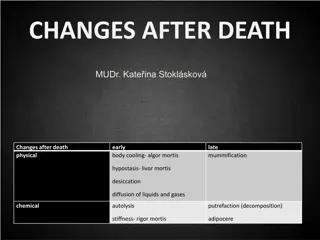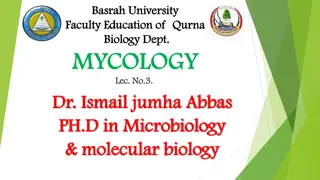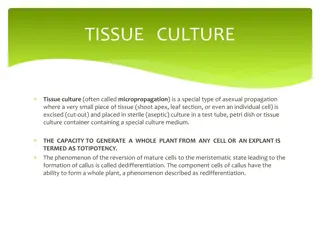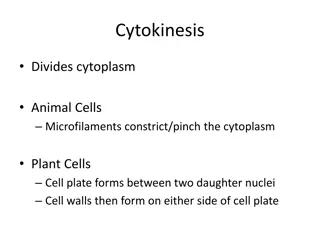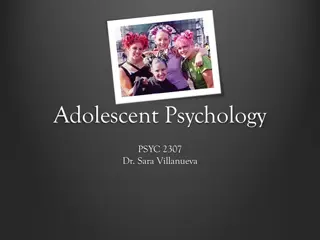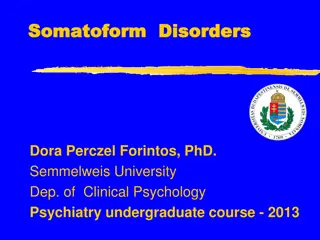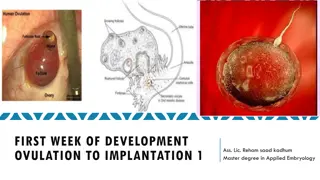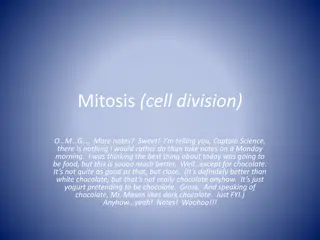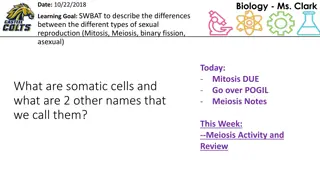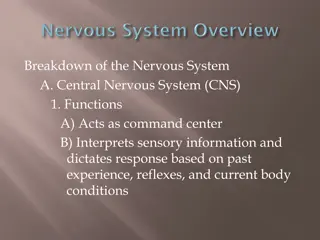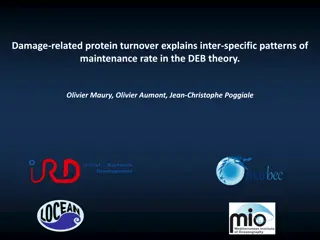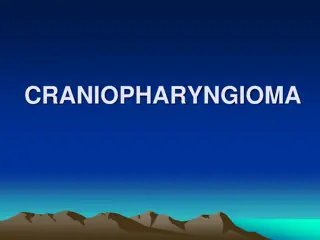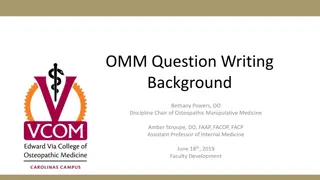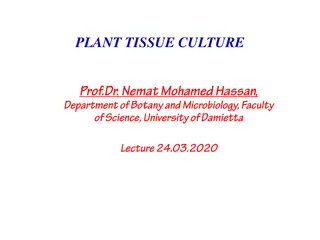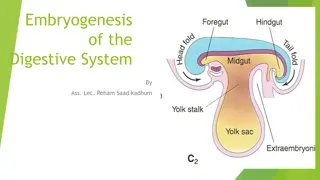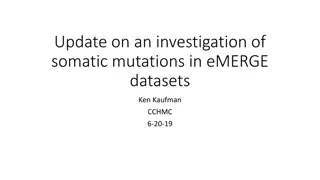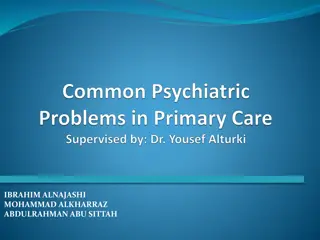The Nervous System
Central and peripheral nervous systems, as well as the somatic and autonomic nervous systems. It covers the components, functions, and control of each system, along with their effects on effector tissues.
0 views • 23 slides
Are you searching for a Sex Therapist in Cremorne
Are you searching for a Sex Therapist in Cremorne, then visit Alice Child - Somatic Sexologist, Sex Therapy & Sex Counsellor. She specializes in Relationship Counselling, Pre Wedding Intimacy Coaching, Tantra Teaching and more. Visit them for more info.
16 views • 6 slides
Gene Therapy and Genome Editing Technology
This article provides insights into the status, regulatory considerations, and delivery methods of gene therapy and genome editing technologies. It discusses approved gene therapies in the US, human genome editing in clinical applications, and the regulatory authority of the FDA over gene therapy. T
3 views • 27 slides
Understanding the Nervous System: CNS, PNS, SNS, and ANS
The nervous system comprises the Central Nervous System (CNS) and Peripheral Nervous System (PNS), with the PNS further divided into the Somatic Nervous System (SNS) and Autonomic Nervous System (ANS). The SNS controls voluntary movements of skeletal muscles, while the ANS regulates involuntary proc
2 views • 23 slides
Addressing Functional Somatic Disorders in Patient Safety Rounds
Explore the burden of functional somatic symptoms in NS Health, delve into emotional factors contributing to somatic symptoms, and learn about evidence-based short-term talking therapy for functional somatic disorders. Gain insights from reference materials and data on unexplained symptoms and emerg
3 views • 29 slides
Agadtantra Department
Death is defined as the irreversible cessation of life, marked by the stoppage of vital organ functions. The diagnosis of death includes clinical criteria like absence of pulse and respiration. Stages of death encompass somatic and molecular death, each with distinct characteristics. Different modes
1 views • 35 slides
Somatic Exercises for Anxiety - trinexpharmacy.com
Somatic Exercises For Anxiety against an invisible enemy. Itu2019s exhausting, and often, traditional methods of managing it donu2019t always work. This is where somatic exercises come in. But what exactly are somatic exercises? Contact : 1 (747) 209 u2013 3649 E-mail : sales@trinexpharmacy.com
2 views • 7 slides
Complex Case Study: Chronic Pain and Somatic Symptom Disorder
Michelle Adams, a 51-year-old hairdresser, presents with severe chronic back pain following a traumatic incident. Despite various treatments and medications, her pain persists, leading to distress and functional impairment. Her symptoms align with Somatic Symptom Disorder (SSD) with predominant pain
0 views • 50 slides
Understanding Mutations: Types, Characteristics, and Examples
Mutations are changes in the genetic material that can affect an organism's traits. This article explores gene mutations, their historical background, characteristics, kinds of mutations like spontaneous and induced, somatic and germinal mutations, and conditional lethal mutations. It also covers ge
2 views • 18 slides
Understanding Plant Embryogenesis: A Comprehensive Overview
Plant embryogenesis is a crucial process in the development of plant embryos from fertilized ovules, involving cell division, differentiation, and morphogenesis. This process leads to the formation of seeds, which play a vital role in the plant life cycle. The stages of embryo formation, structure,
0 views • 25 slides
Understanding Phytophthora: Destructive Plant Pathogen
Phytophthora is a destructive plant pathogen that infects various crops, causing symptoms like leaf lesions and rotting tubers. Its somatic structure includes profusely branched hyphae, and it reproduces asexually through zoospores. The germination process involves the spread of spores by wind and w
1 views • 21 slides
Understanding Somatic Symptom Disorders, Conversion Disorders, and Dissociative Disorders
Somatic symptom disorders manifest as physical symptoms without apparent cause, while conversion disorders involve specific physical symptoms incompatible with medical conditions. Illness anxiety disorder involves interpreting normal sensations as disease symptoms. Dissociative disorders lead to a s
1 views • 41 slides
Understanding SYNCHYTRIUM: Causes, Symptoms, and Control of Potato Wart Disease
Synchytrium endobioticum causes potato wart disease, prevalent in cool, moist climates globally. The disease affects underground parts, causing dark brown outgrowths on tubers and shoots. Infected tubers become deformed, tasteless, and unfit for consumption. Classification, symptoms, somatic structu
1 views • 20 slides
Understanding Somatic Symptom and Related Disorders
Exploring the key features, diagnostic criteria, contributing factors, and management principles of Somatic Symptom and Related Disorders. This comprehensive guide covers the clinical manifestations, co-morbidities, and treatment approaches associated with these disorders, shedding light on somatic
2 views • 38 slides
Understanding Mutations in Biology
A mutation in biology refers to changes in the nucleotide sequence of an organism's genome. These alterations can either be harmful, leading to conditions like cancer, or beneficial, such as providing antibiotic resistance. Mutations can occur in somatic cells or gametes, affecting both the individu
1 views • 18 slides
Understanding Somatic Symptom Disorder and Related Disorders
This educational material delves into Somatic Symptom Disorder, Factitious Disorder, and Malingering, emphasizing the importance of accurate diagnosis and management. It explores various aspects, including symptoms, classifications, and implications in bridging physical and mental health. The conten
0 views • 91 slides
Understanding Chytridiomycota: The Flagellated Fungi
Chytridiomycota is a phylum of fungi distinguished by having motile spores with a single posterior flagellum. They are primarily aquatic, parasitic on algae and animals, and play a role in plant diseases. Their unique characteristics include alternation of generation and somatic phase with rhizoids.
8 views • 11 slides
Understanding Cholinergic Neurons and Agonists in Pharmacology
Cholinergic neurons play a vital role in neurotransmission by utilizing acetylcholine (ACh) as a neurotransmitter. This neurotransmission involves steps like synthesis, storage in vesicles, release, receptor binding, degradation, and recycling of choline and acetate. Choline acetyltransferase cataly
0 views • 30 slides
Understanding Biological Effects of Radiation in Radiation Biology Lecture
This lecture by Dr. Zaid Shaker Naji delves into the biological effects of radiation, including deterministic and stochastic effects. It covers mechanisms of damage at the cellular level, such as direct and indirect damage, and discusses somatic and genetic damages that can arise following exposure.
0 views • 10 slides
Insights on Changes After Death and Definition of Death in Medical Science
Explore the physical changes that occur after death, such as body cooling, mummification, and putrefaction. Learn about the traditional and modern criteria for determining death, including somatic and brain death. Delve into the complexities of cellular death and the implications for organ transplan
1 views • 26 slides
Introduction to Myxomycetes: The Fascinating World of Slim Molds
Myxomycetes, commonly known as slim molds, are unique organisms that live in cool, wet habitats, primarily on wood in forests. They lack hyphae and instead have a plasmodium as their somatic structure. These fascinating organisms exhibit holozoic nutrition and reproduce by means of spores inside spo
0 views • 6 slides
Understanding Tissue Culture and Explant Selection in Plant Micropropagation
Tissue culture, or micropropagation, involves propagating plants from small tissue pieces in sterile culture. The process of dedifferentiation and redifferentiation allows for the regeneration of whole plants from individual cells or explants. Explants, selected from meristematic tissue, develop cal
0 views • 47 slides
Understanding Chromosomes: Key Components, Functions, and Significance
Chromosomes, essential in mitosis and meiosis, are condensed forms of DNA vital for heredity, mutation, and evolution. Learn about their structure, role in inheritance, and impact on species development through historical discoveries. Discover the importance of chromosome sets and genomes in gametic
0 views • 38 slides
Overview of Cell Division Processes: Mitosis and Meiosis
Cell division involves two main processes: mitosis and meiosis. Mitosis is responsible for the division of somatic cells, producing identical daughter cells. It consists of prophase, metaphase, anaphase, and telophase, followed by cytokinesis. In contrast, meiosis is crucial for the formation of gam
4 views • 37 slides
The Phenomenology of Temperature Awareness in Distance Running
Researchers at the University of Gloucestershire explore the embodied consciousness of distance runners, focusing on thermoception and temperature regulation. Utilizing sociological phenomenology and phenomenological ethnography, the study delves into the sensory experiences of runners, emphasizing
0 views • 29 slides
Understanding Adolescent Psychology: Development, Transitions, and Puberty
Exploring the complexities of adolescence, this content delves into the various phases and transitions young individuals experience during this critical period. Topics covered include biological, cognitive, and social transitions, puberty, the endocrine system's role in development, and somatic chan
0 views • 33 slides
Understanding Somatoform Disorders: Symptoms, Diagnosis, and Treatment Options
Somatoform disorders are characterized by physical symptoms that mimic general medical conditions without an underlying medical or mental disorder. Patients often exhibit somatic symptoms without an organic basis, have poor insight, and do not find reassurance helpful. Common types include somatizat
0 views • 46 slides
Overview of the First Week of Development from Ovulation to Implantation
The first week of development after ovulation involves key processes like fertilization, cleavage, and blastocyst formation. It begins with the maturation of the primary oocyte in the follicle, leading to ovulation and potential fertilization. During this period, hormonal changes in the ovarian cycl
0 views • 21 slides
Luxembourg's Approach to Testing and Linkage to Care in Prison Settings
Luxembourg's approach to testing and linkage to care in prison settings is comprehensive and involves thorough medical services, including somatic medicine and psychiatric care. The system ensures that every inmate is seen by a medical doctor within 24 hours, undergoes blood tests, receives appropri
0 views • 14 slides
Comprehensive Notes on Mitosis and Cell Division Process
Exploring the fascinating world of mitosis and cell division, this extensive collection of notes covers topics such as why cells need to divide, the cell cycle, interphase phases (G1, S, G2), and the essential process of mitosis in somatic cells. Supported by vivid images, the content delves into th
0 views • 21 slides
Biology Class Learning Goals and Activities with Ms. Clark
Ms. Clark's biology class focuses on understanding the differences between types of sexual reproduction such as mitosis, meiosis, binary fission, and asexual reproduction. Students learn about somatic cells, genetic variation in meiosis, DNA, genes, and chromosomes. Activities include notes, videos,
0 views • 4 slides
Understanding Somatization in Family Medicine
Somatization is a prevalent human experience with significant impact on healthcare resources. Dr. Jon Davine explores the complexities of somatoform disorders, their implications on medical budgets, and the challenges faced by primary care practitioners in diagnosing and treating patients with unexp
0 views • 52 slides
Overview of the Nervous System Components and Functions
The nervous system is comprised of the central nervous system (CNS) and the peripheral nervous system (PNS). The CNS acts as the command center, interpreting sensory information and coordinating responses. The PNS conveys information to and from the CNS through somatic and visceral sensory neurons,
0 views • 48 slides
Exploring Damage-Related Protein Turnover in Relation to Somatic Maintenance in the DEB Theory
Unraveling the intricacies of somatic maintenance, this study delves into the role of protein turnover in explaining inter-specific maintenance rate patterns within the Dynamic Energy Budget (DEB) framework. Empirical observations shed light on the metabolic processes involved in maintaining organis
0 views • 14 slides
Comprehensive Overview of Craniopharyngioma: History, Pathology, and Treatment Considerations
Craniopharyngioma is a complex intracranial tumor with a rich historical background dating back to the early 20th century. Initially described by McLean, Frazier, Alpes, and famously studied by Cushing, this tumor continues to be a subject of debate and controversy in terms of treatment approaches a
0 views • 76 slides
Overview of Osteopathic Medicine: History, Somatic Dysfunctions, and Treatments
Osteopathic Medicine, pioneered by Dr. Andrew Taylor Still in 1874, focuses on treating illness within the context of the whole body. The history of osteopathic medicine, including challenges faced by D.O.s, and the concept of somatic dysfunctions are explored. Somatic dysfunctions refer to restrict
0 views • 19 slides
Understanding Plant Tissue Culture and Regeneration Pathways
Plant tissue culture techniques such as Organogenesis and Somatic Embryogenesis play a crucial role in regenerating whole plants from meristem cells. The process involves the formation of organs directly from explants or callus structures and the production of adventitious organs like roots, shoots,
1 views • 34 slides
Embryogenesis of the Digestive System: A Detailed Overview
Formation of the gut tube during embryogenesis involves cephalocaudal and lateral folding of the embryo, resulting in the development of the foregut, midgut, and hindgut. The yolk sac and the allantois play key roles in the formation of the primitive gut. As the embryo develops, the vitelline duct a
0 views • 32 slides
Comprehensive Analysis of Somatic Mutations in eMERGE Datasets
This investigation delves into somatic mutations across normal tissues, revealing macroscopic clonal expansions. The study processed a large number of samples and identified candidate mutations, with characteristics and functional predictions detailed. Genes with the most somatic mutations are highl
0 views • 24 slides
Understanding Anxiety, Depression, and Somatic Symptom Disorder in Saudi Arabia
This content discusses the prevalence, etiology, clinical features, and management of anxiety, depression, and somatic symptom disorder in Saudi Arabia. It also covers the importance of counseling and psychotherapy in family medicine settings and knowing when to consult a psychiatrist. The content i
0 views • 50 slides
